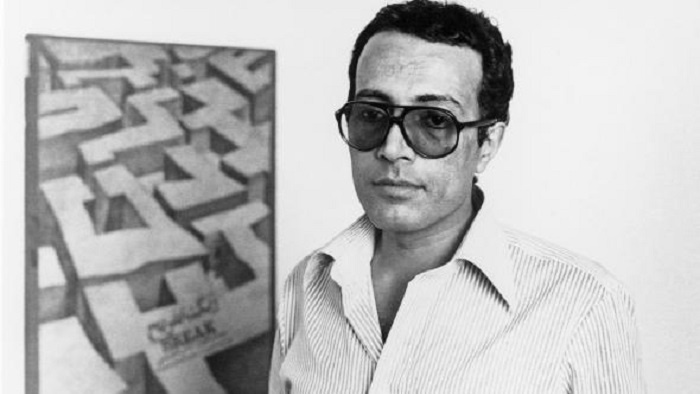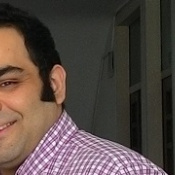Resting Time for Kiarostami

It may sound ironic: Abbas Kiarostami was a man deeply in love with life, but on Tuesday July 5, Iranian newspapers hardly had any difficulty choosing a headline to announce his death: a simple wordplay with the title of one of his movies would do. Had he watched it from the afterworld, Kiarostami would have become surprised, or perhaps upset.
This infatuation with life was acknowledged in messages of condolence sent by Iranian and foreign officials. In his Persian Twitter account, Iran's President Hassan Rouhani praised Kiarostami for his "different, deep outlook on life" and for inviting humankind to peace and friendship. Rouhani was not the only head of state who addressed Kiarostami's death. In France, where Abbas Kiarostami received the most prestigious award of his lifetime, the Cannes Festival Palm d'Or, and was granted the Légion d'honneur decoration, President Francois Hollande released a statement, praising the 76-year old Iranian director for giving a "special, universal dimension" to everyday life. Foreign Minister Javad Zarif was the first senior domestic official to express condolences on the death of Abbas Kiarostami. "Iran has lost a towering figure in international cinema. May the Almighty receive him in His Infinite Mercy. Rest in peace ostad" he twitted on Tuesday morning. French Minister of Foreign Affairs, Jean-Marc Ayrault, also expressed sorrow at the death of Abbas Kiarostami, calling him a "leading filmmaker" and a "consummate artist" who "spread his unique vision of Iran all over the world, leaving his imprint on the history of cinema".
Despite nearly universal acclaim among movie critics outside homeland, Kiarostami's style did not always receive a warm welcome by domestic analysts. Throughout the years, particularly during the late 1980s and the early 1990s, Kiarostami, and his followers, were accused of 'siaahnamayi', that is, portraying a dark picture of Iran to satisfy international viewers.
Katayoon Shahabi, Iranian film producer and a jury member of the 2016 Cannes Film Festival rejected such accusations in her interview with Iranian Diplomacy. "They had no understanding of the international landscape of cinema then" she says of those who criticized Kiarostami for producing festival-oriented films. "He made movies that were important to himself; he did not care if others were satisfied or not, … he did not care if his movies sold or not" she adds. Shahabi reminded that "the continuous success of his movies was not an incident" and owed to "the new style, the fresh ideas" that Kiarostami introduced to cinema.
Kiarostami's most vocal critic inside Iran was probably Morteza Avini. Avini, who turned into a cultural icon of the revolution after his tragic death in a minefield laid by Saddam Hussein's Army, saw Kiarostami's critically-acclaimed "Homework" as "tens of drawn-out interviews, [and] a handful of trivial TV-style shots from school students' morning routine" only achieving fame due to the "manufactured reputation" of Kiarostami. "Why didn't the movie apprehend the suffering of the oppressed?" he said, echoing the egalitarian soul of Iran of the 1980s. "Why was Mr. Kiarostami's movie so alien towards the social milieu of the children, merely pursuing its own questions and trying to impose its aristocratic criteria upon the poverty-stricken life of these children?"
In September 2014, Ebrahim Hatamikia, a disciple of Aviny and popular Iranian director known for his movies on the eight-year Iran-Iraq war, launched a verbal fight against Kiarostami, calling him the "grandmaster" of directing movies that are oblivious towards societal concerns. "There are those who can close their eyes on a country [struggling] with a 1200-km-long war front and care about their notebook," alluding to "Where Is the Friends' House?", directed by Kiarostami in 1987, at the peak of Iran-Iraq war. Nearly two decades earlier, Hatamikia had taunted Kiarostami in his controversial movie, The Glass Agency: the haughty, Paris-bound character who never took off his sunglasses and warned the hostage-takers, desperate war veterans, that killing him, "a cultural figure" was incorrect. Kiarostami's response to Hatamikia, slamming the latter for encouraging youngsters to join the "meaningless" war against Saddam Hussein passed a sensitive boundary and raised a strong wave of criticism against him in Iran's Principlist media.
"He was Iran's first cultural ambassador … at the height of Iranophobia" Katayoon Shahabi recalls. "His movie 'Where Is the Friend's House?' caught the world by surprise: it spoke neither from war nor from hatred, and it debunked all the anti-Iran propaganda" she tells us. Shahabi remembers meeting Japanese nationals who had fallen in love with the Iranian culture and Persian language after watching Kiarostami's movies.
"I've known Abbas for years. Me and all those who know him can testify to his patriotism … how could they doubt his belief in the Sacred Defense?", the war with Iraq, asked Sadegh Kharrazi, Iran's former ambassador to France. Such defense may have added to Hatamikia's suspicion who had earlier called Kiarostami a "darling" of Iran's diplomatic apparatus and claimed that his award-winning "Taste of Cherry" was selected for the 1997 Cannes Festival thanks to lobbies by then-Foreign Minister Ali-Akbar Velayati, an allegation that Iran's longest-serving foreign minister later denied.
It was not only 'revolutionary' artists who criticized Kiarostami for his presumed apolitical and asocial approach to cinema. In the height of 2009 demonstrations by the Green Movement, following the controversial reelection of Mahmoud Ahmadinejad to presidency, Bahman Ghobadi, a disciple of Kiarostami and also a co-winner of the Caméra d'Or award at the Cannes Film Festival in 2000, wrote an open letter to him questioning his attitude.
"I, and all those who love cinema, have always respected your personal definition of cinema, but this does not entitle you … to deem unworthy movies that unlike your works do not remain silent and oblivious to social concerns" Ghobadi wrote. "Be it correct or not, in these crucial days, the only measure for honor and dignity is supporting the people and not their opponents ... people will not forget the silence of the artists. They are the best jury."
Kiarostami came into spotlight in the last days of the last Persian year, mid-March 2016, when he was admitted to the hospital. His deteriorating health conditions after four successive surgeries led to rumors about medical malpractice and soon turned into a media sensation, forcing the minister of health to intervene and supervise his treatment. A couple of months later, he traveled to France to continue his treatment. And then there was his unexpected death.
"If one day I have to choose between myself and my works, I prefer myself to remain and not my works" he had said once. While he could not have such a choice between the two, this was definitely not the way Kiarsotami wanted to face his inevitable fate.
Abbas Kiarostami's funeral will be held tomorrow Sunday, starting from Kanoun-e Parvaresh-e Fekri, the Institute for the Intellectual Development of Children and Young Adults, where he started his career in cinema in the early 1960s. "If you are going to bid farewell to my father on Sunday, I advise you to wear a beautiful dress to celebrate his fruitful, decorated life, not to mourn his departure" wrote Kiarostami's son Ahmad in his Instagram account. "If you had met him even once, you know what a good storyteller he was. Come back from the funeral with a story, not with a memory."


